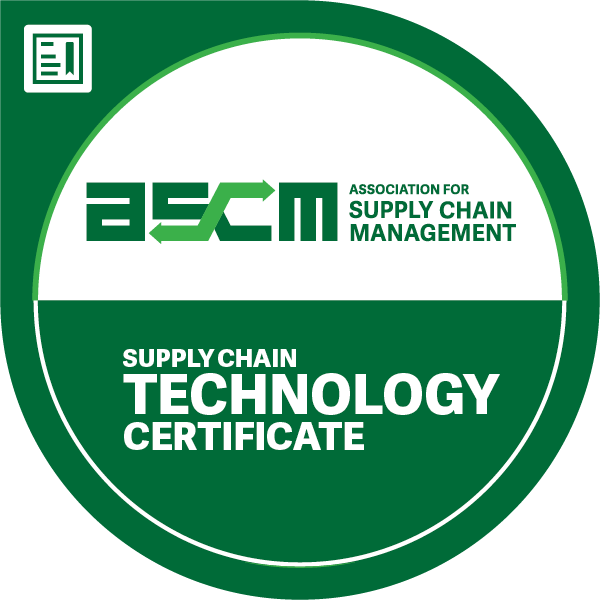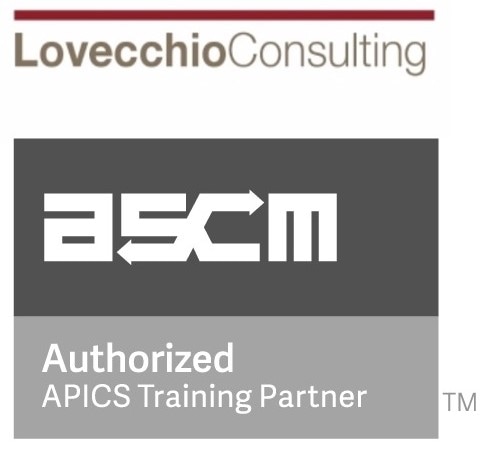
CORSO ASCM TECHNOLOGY CERTIFICATE - LIVE ONLINE
LIVE ONLINE ASCM COURSE TECHNOLOGY CERTIFICATE
- Obiettivo
-
Questo corso si occupa di preparare le figure professionali come il responsabile ITC, logistica, produzione, il buyer, il supplier/scheduler, etc. perchè possa svolgere al meglio le attività legate alle tecnologie emergenti
-
Benefici
Adottare standard e protocolli in ambito tecnologico è essenziale per distinguersi grazie ad un approccio metodologico, ed essere riconosciuti come esperti nella materia, in modo da proporre e realizzare le giuste soluzioni. -
Il programma Supply Chain Technology Certificate, sviluppato da ASCM, introduce alle tecnologie emergenti, illustra come implementarle per i miglioramenti organizzativi e consente di avere una visione di insieme su come impattano sulle prestazioni della supply chain.
-
Objective
-
This course is designed to prepare ICT, manufacturing, warehouse managers, buyers, supplier/schedulers, etc., in order to better perform activities related to emerging technologies.
-
Benefits
The Supply Chain Technology Certificate program, developed by ASCM, introduces to emerging technologies, explains how to implement them for organizational improvement and provides an overview of how they directly affect supply chain performance.
Adopting standard and best practices in technology management is key to stand out from the crowd with a methodological approach, and be recognized as experts in the field, in order to advice and apply the right solutions.
Luogo del corso/place: live online
Date di avvio/Starting dates - chiamaci / call us
Orario / Time: Dalle 17.30 alle 20.30 - From 5.30 p.m. to 8.30 p.m. (Rome time GMT+1)
Numero totale sessioni /Number of sessions: 6
Altre sessioni: ogni martedi successivo con sessioni di durata di 3 ore ciascuna / Other sessions: every next tuesday with each session of a 3-hour duration.
Durata totale/Total duration: 18 ore / 18 hours
Il corso è erogabile in italiano, inglese o francese / The course can be held in italian, french or english.
Oltre il corso, sono necessarie almeno 20 ore di studio individuale per prepararsi all'esame / Beyond the course, at least additional 20 hour of self study are necessary to do the exam.
CONTENUTI PRINCIPALI / MAIN CONTENTS
MODULE A: BLOCKCHAIN
What Is Blockchain?Defining Blockchain
Why Is Blockchain Important?
Key Elements of a Blockchain
How Blockchain Works
Blockchain Consensus
Types of Blockchains
Different Types of Blockchain Networks
Public Blockchain
Private Blockchain
Public versus Private Blockchains
Advantages and Disadvantages of Using Blockchain
Benefits of Blockchain
Smart Contracts
Non-fungible Tokens (NFTs)
Threats to Blockchain Security
Blockchain Implementation
Factors to Consider When Implementing Blockchain
Implementation Steps
Advantages and Disadvantages of Using Blockchain
How Is Blockchain Used in Supply Chain?
Case Study: An American Multinational Retail Corporation
Case Study: PharmaLedger
Case Study: A Global Leader in Logistics
Case Study: An American Multinational Automobile Manufacturer
Case Study: A Swiss Multinational Food and Drink Processing Company
MODULE B: ADVANCED ANALYTICS AND AUTOMATION
What Are Advanced Analytics and Automation?Advanced Analytics End-to-End
Analytics Process Automation
Automation—Robotics
Advanced Analytics Methods
Operations Research and Management Sciences
Descriptive, Diagnostic, Prescriptive, Predictive and Cognitive Analytics
Dashboards
Data Mining
The Importance of Data and Data Mining
The Data Mining Process
Data Mining Tools— Extract, Transform, Load (ETL)
Data Mining Tools—Relational Databases and SQL
Data Mining Tools—CRISP-DM
Data Storage and Security
Data Warehouses
Cloud Computing
Data Security
Artificial Intelligence
Types of Artificial Intelligence
Machine Learning and Deep Learning
Supervised and Unsupervised Learning
Natural Language Processing
Selecting and Implementing New Technology
Steps to Selecting New Technology
Total Cost of Ownership
Implementation
Best Practices
Employee Skills
MODULE C: INTERNET OF THINGS
What Is the Internet of Things?Defining IoT
Evolution of IoT
Visibility and the Need for Track and Trace
Supply Chain Visibility
What Is Track and Trace
Barcoding and QR Codes
Radio Frequency Identification (RFID)
Types of RFID
Not Just “Where Is My Package”—The Importance of IoT
IoT and Data Regulation
Technology Needed for IoT
The Cloud
Data Capture and Translations
Data Transmission
Data Access and Actionability
IoT Infrastructure
What Is an IoT Platform?
Enablement Device and Software Management
Data Synchronization
Application Programming Interfaces (APIs)
Data Streaming
Event Management
Accessibility to IoT Data Feeds
Data Intelligence and Analytics
Big Data Sets
Edge Computing
Digital Twins
What Is a Digital Twin?
More than Just Sensor Data
Containerization
IT/OT Convergence
IOT and Business Segment Applications
Integration of IoT into Business Sections
Shop Floor and Field Operations Visibility
Predictive Maintenance
Remote and Outsourced Operations
Retail
Challenges to Implementation
Financial Impact
Cybersecurity
Data Sovereignty
MODULE D: CYBERSECURITY
What Is Cybersecurity?Evolution of Cybersecurity
Cybersecurity Inside the Organization
Cybersecurity—Who, What, Why, and How?
Cybersecurity in Supply Chain and Other Business Relationships
Cybersecurity Governance
Why Have Cybersecurity Governance Programs?
What Should Cybersecurity Governance Programs Look Like?
Why Do Cybersecurity Governance Programs Fail?
Cybersecurity Risk Assessment, Management, and Mitigation
Risk Assessment
Risk Management
System-Related Risk Mitigation
Non-System-Related Risk Mitigation
Enterprise Cybersecurity Education
Employee Training
IT Education and Cybersecurity Training
Cybersecurity Risk Training across Supply Chain Partners
Network Access Controls and Monitoring Methodologies
Network Access Control Solutions
Network Access Control—Employees
Network Access Control—Suppliers and Business Partners
Monitoring Methodologies
Redundancy, Firewalls, and Anti-Hacking Technology
Redundancy and Methods to Achieve It
Firewalls
Anti-Hacking Technology
MODULE E: DEMAND PLANNING TECHNOLOGIES
The Importance of Demand Planning Technologies in Supply ChainWhat is Demand Planning?
Demand Planning Technologies
Essential Steps in Forecasting
Demand Steps in the Forecasting Process
Determining What to Forecast
Sources of Data for Forecasting
A Smartphone Accessory Retail Case Study
Forecasting Methods Used in Supply Chain
Types of Forecasting Methods
Judgmental Forecasting Method
Statistical Forecasting Method
Combination Forecasting Method
Choosing the Right Forecasting Method
The Future of Demand Planning
Elements of Demand Planning
Why is Demand Planning Important?
Methods of Demand Planning Using Technology
Machine Learning (ML) For Better Demand Predictions
Streamline Forecasting Processes with AI
Role of IoT in Demand Planning
Social Media and User-Generated Online Traffic Data
Time Series Forecasting: Use Cases
Technology Company Forecasting Problem
Traditional Planning versus Technology Planning
Reliability of Forecasting
Sources of Forecasting Errors and How to Reduce Them
Types of Errors
The Role of Demand Planning in Inventory Control
How Demand Planning Fits within Inventory Control
Methods of Inventory Control
Strategies Used in Production Planning and Scheduling
Production Environments
Il materiale didattico e l'esame ASCM per ottenere il certificato sono in inglese. / The course material and the ASCM exam to get the certificate are in english.
DOCENTE / INSTRUCTOR: GIUSEPPE LOVECCHIO
Giuseppe Lovecchio is APICS Master Instructor, Subject Matter Expert, part of the ASCM Subcommitte updating CSCP and CLTD learning systems, and of the ASCM technical contributorsteam, updating SCOR to SCOR DS
Demand Driven Endorsed Instructor
-
Clicca qui per il Subject Matter Expert
- CLICCA QUI PER IL VIDEO SUL CSCP / CLICK HER FOR THE VIDEO ON CSCP
- ALTRI CORSI APICS /OTHER APICS COURSES
- Which APICS certification is right for me ? click here
- Corso CPIM: clicca qui
- CPIM course : click here
- CLTD course: click here
- SCOR-P: clicca qui
- SCOR: click here
- CLICCA QUI PER LA POLITICA SULLA PRIVACY / CLICK HERE FOR THE PRIVACY POLICY
CLICCA QUI PER IL CATALOGO CORSI
CLICK HERE FOR THE COURSE CATALOGUE
CLICCA QUI PER ALTRI CORSI ONLINE DAL VIVO / CLICK HERE FOR OTHER LIVE ONLINE COURSES
Il materiale didattico e l'esame APICS per ottenere la certificazione sono in inglese. / The course material and the APICS exam are in english.
APICS Master Instructor e Subject Master Expert del learning system CLTD
Demand Driven Endorsed Instructor
CLICCA QUI PER LA BROCHURE APICS CSCP /CLICK HERE FOR THE APICS CSCP SHEET
-
Clicca qui per il Subject Matter Expert
- CLICCA QUI PER IL VIDEO SUL CSCP / CLICK HER FOR THE VIDEO ON CSCP
- ALTRI CORSI APICS /OTHER APICS COURSES
- Which APICS certification is right for me ? click here
- Corso CPIM parte 1: clicca qui
- CPIM Part 1 course : click here
- CLTD course: click here
- SCOR-P: clicca qui
- SCOR-P: click here
- CLICCA QUI PER LA POLITICA SULLA PRIVACY / CLICK HERE FOR THE PRIVACY POLICY
CLICCA QUI PER IL CATALOGO CORSI
CLICK HERE FOR THE COURSE CATALOGUE
CLICCA QUI PER ALTRI CORSI ONLINE DAL VIVO / CLICK HERE FOR OTHER LIVE ONLINE COURSES
